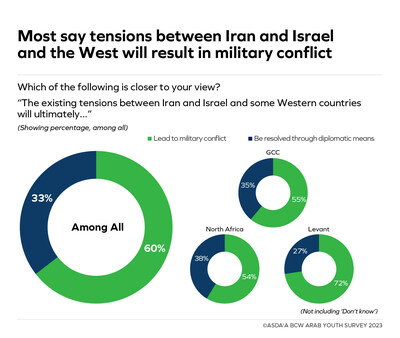Nearly two-thirds of young Arabs say the tensions between Iran and Israel and the West will lead to military conflict: 15th annual ASDA'A BCW Arab Youth Survey
- Relations between Iran, Israel, and the West are expected to deteriorate into military conflict. The UAE, Egypt, and Morocco are in favor of closer diplomatic relations with Israel. The UAE is considered the top 'model nation' by young Arabs.
- Most Arab youth oppose the normalization of ties with Israel. The United States and Russia are viewed as less influential in the Arab world.
Insights
Analyzing...
- Two-thirds say the Palestinian-Israeli conflict will not be resolved soon, while 4 in 10 (
39% ) say it does not get attention it deserves from the Arab world - Reflecting shifting geopolitical allegiances, Arab youth say
Turkey andChina are the top non-Arab allies of their country but the US still dominates Middle Eastern affairs - Most Arab youth oppose normalisation of ties with
Israel but a majority in theUAE ,Egypt andMorocco favour closer diplomatic relations with the country

The findings this year also highlight the shifting geopolitical allegiances in the Arab world, with the region's youth saying they view
These are some of the key insights from the landmark 15th annual ASDA'A BCW Arab Youth Survey, unveiled today by ASDA'A BCW, the
ASDA'A BCW commissioned SixthFactor Consulting, a leading research company, to conduct face-to-face interviews with 3,600 Arab citizens aged 18 to 24 in their home nations from March 27 to April 12, 2023. The largest sample in the survey's history was equally divided between men and women in 53 cities across a total of 18 Arab states, including for the first time
The 75-year Palestinian-Israeli conflict won't be resolved soon
Arab youth are also pessimistic about the prospects for peace in the Palestinian Territories, with most surveyed saying the 75-year conflict between Palestinians and Israelis won't be resolved within the next five years.
Although a majority (
Moreover, nearly four in 10 (
A divergence of views on closer ties with
Most Arab youth oppose the normalisation of ties between Arab countries and
When young Arabs were asked whether they supported or would endorse their government's decision to normalise diplomatic ties with
Despite the Abraham Accords signalling a thaw in relations between
Shifting geopolitical allegiances
Among non-Arab nations,
The US and
At the same time, they say the US continues to exert the most influence in the Arab world. Compared to only
However, most would like the US to be less involved in Middle Eastern affairs, with nearly two-thirds across the GCC,
Views on 'model nations'
For the 12th consecutive year since young Arabs were asked to name the countries they consider 'model nations', they have said the
Significantly, three GCC nations, the
Nearly one in four Arab youth (
As in previous surveys, a variety of factors account for the
Sunil John, President, MENA, BCW and Founder of ASDA'A BCW, who has led the survey over the past 15 years, said: "The annual ASDA'A BCW Arab Youth Survey has proven to be an indispensable resource for global decision makers in government and business seeking a clearer understanding of a region that is increasingly influential in world affairs, yet still an enigma for many. Once again, the study sheds new light on the Arab world's changing geopolitical landscape."
"While several conflicts in the region, such as in
In the coming weeks, ASDA'A BCW will publish insights under the other five themes covered in the study: My Politics, revealing what young Arab say about the performance of their government; My Livelihood, detailing their views on education, jobs, and their finances; My Identity, covering religion and issues of personal identity; My Aspirations, the hopes of young Arabs for the future; and My Lifestyle, highlighting their habits, pastimes, and the media they consume.
Findings on climate change, mental health and gender rights will also be disclosed, making this year's study the most extensive in the survey's history. The overall theme of the 15th edition of the ASDA'A BCW Arab Youth Survey is 'Living a New Reality'.
To know more about the findings, log on to arabyouthsurvey.com
Notes to Editors:
About the ASDA'A BCW Arab Youth Survey
The annual ASDA'A BCW Arab Youth Survey, now in its 15th year, is the largest study of its kind of the Arab world's largest demographic, its over 200 million youth. The survey fills a vital gap in critical data and insights on this very important demographic segment. The evidence-based insights inform governments, the private sector, multilateral institutions and academics on policymaking and business strategy.
The 15th annual ASDA'A BCW Arab Youth Survey explores the hopes, fears and aspirations of young Arabs in 53 cities in 18 states in the
The survey covered five Gulf Cooperation Council states (
www.arabyouthsurvey.com
Follow, like, share on Facebook; Twitter; Instagram; YouTube, LinkedIn and TikTok
About ASDA'A BCW
ASDA'A was founded in 2000 as an independent communications firm by Sunil John, who leads the agency in its 24th year. In 2008, WPP (NYSE: WPP) acquired a majority stake in ASDA'A and merged it with BCW, one of the world's top three communications firms. The agency has a team of nearly 200 professionals across its seven wholly owned offices. With an additional 11 affiliates, ASDA'A BCW covers 16 countries across the
Follow, like, share on Facebook, Twitter; Instagram; YouTube and LinkedIn.
About BCW
BCW, a leading global communications agency, is in the business of moving people on behalf of clients. BCW partners with clients in the B2B, consumer, corporate, crisis management, healthcare, public affairs, purpose and technology sectors to set strategic direction for all communications and create powerful and unexpected ideas that earn attention. Through an Earned-Plus offer – earned media plus paid media, creative technology, data, AI and an expanding suite of innovative capabilities – BCW moves people with power and precision to move its clients forward. BCW is a part of WPP (NYSE: WPP), a creative transformation company.

Photo - https://mma.prnewswire.com/media/2105568/ASDA_A_BCW_Arab_Youth_Survey.jpg
Photo - https://mma.prnewswire.com/media/2105571/ASDA_A_BCW_Arab_Youth_Survey.jpg
SOURCE ASDA'A BCW







